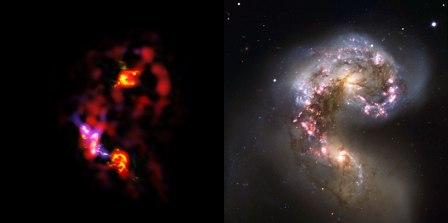Kapteyn Institute helps build Chile observatory
On Monday 3 October the first astronomical observations were made with ALMA, the Atacama Large Millimeter Array in Chile. This telescope will comprise 66 antennae, together forming the world’s largest telescope. Thus far twenty antennae have been installed.
Instrument for electromagnetic spectrum
Each antennae has an instrument developed by the Kapteyn Astronomical Institute of the University of Groningen. This instrument makes it possible to observe the millimetre range of the electromagnetic spectrum. ALMA observes the universe in light with millimetre and submillimetre wavelengths, roughly one thousand times longer than visible-light wavelengths. Using these longer wavelengths allows astronomers to study extremely cold objects in space — such as the dense clouds of cosmic dust and gas from which stars and planets form — as well as very distant objects in the early universe.
Antennae Galaxies, side-by-side comparison of ALMA and VLT observations

Colliding galaxies
One of ALMA’s first astronomical observations captured the Antennae Galaxies NGC 4033-4039, a pair of distorted colliding spiral galaxies about 70 million light-years away.From their collision new stars are born. Astronomers are very interested in this kind of star forming areas.
More information: ESO-website (European Southern Observatory)
More news
-
19 December 2025
Mariano Méndez receives Argentine RAÍCES award
-
18 December 2025
Why innovate, and for whom?
-
17 December 2025
Ben Feringa wins Feynman Prize
